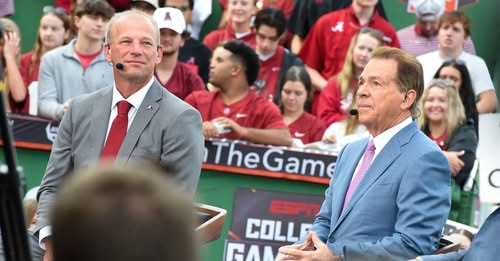“New Era, New Energy: Alabama Players Speak Candidly on Culture Shift from Nick Saban to Kalen DeBoer”
The University of Alabama football program is in uncharted territory — not because it’s rebuilding or struggling, but because, for the first time in over 16 years, it’s moving forward without the man synonymous with its modern dynasty. After Nick Saban announced his retirement in January 2025, the most dominant era in college football officially came to a close. The man chosen to lead the Crimson Tide into a new chapter? Kalen DeBoer, a coach known for high-powered offenses, player-driven leadership, and an approachable coaching style that stands in contrast to the famously demanding Saban.
Now, several months into the transition, Alabama players are opening up about what’s changed. And while the foundation laid by Saban remains firmly intact — toughness, precision, excellence — there’s no denying that a new energy has taken hold in Tuscaloosa.
“This isn’t about forgetting Coach Saban,” said senior offensive lineman Tyler Booker. “He built the standard. But Coach DeBoer has brought a different vibe. It’s more relaxed in some ways, but it’s still intense. It’s just… more modern. More player-focused. I think we needed that.”
Booker isn’t alone. Throughout spring ball, summer workouts, and now the early stages of fall camp, a theme has emerged: DeBoer is embracing the Alabama legacy without trying to replicate it — and the players are responding.
“There’s been a culture shift,” said junior safety Malachi Moore. “It’s not better or worse. It’s just different. We’re still held accountable, but the communication is different. The energy is different. It feels like we have more of a voice.”
Under Saban, Alabama operated with machine-like discipline. Practices were tightly structured, language was precise, and decisions came from the top down. The “Process” — a term Saban used to describe his method of building championship teams — emphasized mental toughness, laser focus, and total commitment. It worked. Six national titles, countless first-round picks, and a reign of terror over the SEC that may never be matched.
But with Saban’s departure, there was uncertainty. Would the next coach try to copy the formula? Would players embrace someone new? And more importantly — could Alabama still be Alabama without the man who rebuilt it?
According to players, DeBoer hasn’t tried to be Saban. And that’s exactly why things are working.
“Coach D has a different style,” said sophomore quarterback Dylan Lonergan. “He talks with us, not at us. Don’t get it twisted — he’ll get on you. But there’s more dialogue. There’s more flexibility. He wants us to understand why we’re doing things.”
DeBoer, who arrived from Washington after leading the Huskies to a national championship game appearance, has built his career on communication, innovation, and trust. His offensive-minded approach is a stark contrast to Saban’s defensive roots, and that shift is already being felt throughout the facility.
Take meetings, for example.
“Coach DeBoer allows a lot more collaboration,” said senior wide receiver Kendrick Law. “We can speak up. Give input. Talk through what we’re seeing. It’s empowering.”
Strength and conditioning workouts have also evolved. While Saban’s strength coach, the legendary Scott Cochran (and later David Ballou), instilled old-school toughness with boot-camp intensity, DeBoer brought in a new performance staff that focuses more on individual optimization — adjusting loads, tracking sleep, and tailoring recovery protocols.
“It’s still hard,” laughed linebacker Jihaad Campbell. “No one’s getting soft. But we’re doing more recovery, more injury prevention. They’re big on making sure we feel good and play hard.”
That doesn’t mean the program has become lax. If anything, players say the bar for performance is higher than ever — just enforced differently.
“We still run. We still hit,” said Moore. “But there’s a little more space to be yourself now. There’s more focus on developing who you are as a person, not just a player.”
That personal connection has resonated. Many upperclassmen admit that while Saban demanded excellence, it sometimes came at the cost of approachability. DeBoer, on the other hand, has made it clear he’s here to know his players.
“Coach Saban was like a CEO. You respected him, but you didn’t always talk to him,” said redshirt junior center James Brockermeyer. “Coach DeBoer knows your story. He checks in. It feels like a family again.”
That’s not a knock on Saban — many players credit him for turning boys into men. But in today’s college football landscape, where NIL, mental health, and player autonomy matter more than ever, DeBoer’s modern approach seems timely.
“He just gets it,” said Booker. “He knows what we’re dealing with — the pressure, the expectations, the social media. He keeps it real with us.”
One of the most noticeable changes is how DeBoer encourages personality. Music during workouts, more open locker room conversations, and player-led initiatives on social issues are all now part of the program.
“We’re encouraged to speak,” said sophomore tight end Ty Lockwood. “Coach tells us, ‘If you want to lead, lead. If you want to grow, speak up.’ It’s different, but it works.”
That difference has not gone unnoticed by alumni, either. Former Tide stars who have returned to visit this offseason say they can feel the change — but they’re optimistic.
“There’s a lighter atmosphere,” said former Alabama linebacker Rashaan Evans during a summer visit. “Guys are still working their tails off, but they’re enjoying it. That’s a good thing.”
And the early results? Promising.
Alabama’s spring game showcased an offense that looked faster, more fluid, and more creative than in recent years. Quarterback play was crisp, tempo was high, and explosive plays were frequent — all hallmarks of DeBoer’s system. Defensive players, while adjusting to a new scheme under DC Kane Wommack, also praised the increased flexibility and game-planning involvement.
“We’re not just reacting,” said Campbell. “We’re thinking. We’re attacking.”
There is, of course, the looming question of whether this new approach can produce championships. Culture changes are great, but in Tuscaloosa, results matter. DeBoer knows that better than anyone.
“This isn’t a rebuild,” he told reporters in July. “It’s a reload. We’re respecting the tradition while building something fresh.”
Players say they believe in the new direction — not because it’s easier, but because it’s authentic.
“He’s not pretending to be Coach Saban,” Moore said. “He’s being Coach DeBoer. And we’re all buying in.”
Buy-in is everything in college football. And so far, Alabama’s locker room appears united. Veterans are stepping up. Young stars are emerging. Coaches are creating connection without compromising discipline. It’s the delicate balance every new regime hopes to strike — and DeBoer seems to be pulling it off.
Still, no one in the building is taking anything for granted.
“We know people are watching,” said Lonergan. “We know the standard. It’s not like that’s gone. We’re just going to get there a different way now.”
Different — but still dominant. That’s the goal.
And as the 2025 season approaches, Alabama finds itself in an unfamiliar position: chasing greatness without the familiar face that defined it. But with a locker room full of belief, a staff committed to connection, and a head coach unafraid to be himself, the Crimson Tide might not be rebuilding after all.
They might be rising.
Again.



